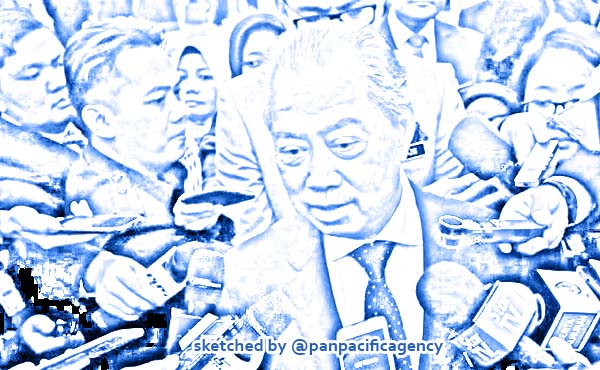[Analytics] Muhyiddin keeps Malaysian politics in lockdown

Tan Sri Muhyiddin Yassin. NSTP/MOHD YUSNI ARIFFIN. Sketched by the Pan Pacific Agency.
Just over six months ago Malaysian Prime Minister Muhyiddin Yassin talked the country’s monarch into declaring a state of emergency — the first in Malaysia since the devastating racial riots of 1969. Muhyiddin said emergency powers were to give his government the political stability and the legal powers needed to enforce COVID-19 control strategies. A spike in cases at the time had threatened to derail what had been overall an effective response to the initial wave of the pandemic in 2020, East Asia Forum reported.
Since then, Malaysia’s COVID crisis has gone from worrying to disastrous. New daily cases reached a peak of over 13,000 on 15 July — worse, on paper, on a per-capita basis than neighbouring Indonesia (where, admittedly, testing rates remain dismal).
The state of emergency has had its desired short-term political effects over these six months, however. A core element has been the suspension of federal parliament — conveniently so for Muhyiddin, whose government is propped up by politicians who defected alongside him in early 2020 to bring down Mahathir Mohamad’s Pakatan Harapan government. Without an electoral mandate of his own, and supported by a slim parliamentary majority, Muhyiddin has kept his party backers happy by doling out seats in a bloated cabinet.
With the emergency orders set to expire on 1 August, the clock might be ticking down on Muhyiddin’s leadership. In early July the former ruling party UMNO formally declared it no longer supports Muhyiddin. But with many of its MPs nevertheless remaining in his cabinet, the party is half-in, half-out. Rival political bosses — including opposition leader Anwar Ibrahim and two-time prime minister Mahathir Mohamad — await Muhyiddin’s downfall for a chance to put together the numbers to support their own prime ministerial bids.
The parliament’s suspension hit pause on this stand-off. It will resume for a ‘special’ sitting on 26 July, just days before the emergency powers expire. Legal experts say that Muhyiddin will need parliamentary approval in order to extend them, but it’s not clear whether he has the numbers to achieve this.
Also unclear is whether MPs will be able to move a motion of no confidence against the prime minister — if such a motion is debated and is successful, parliament must be dissolved and an election called within 60 days. With the government signalling it won’t allow any debate during next week’s session, Muhyiddin’s opponents will likely have to wait for the next regular sitting of parliament in early September.
An election would finally put Muhyiddin’s prime ministership out of its misery. But it’s the last thing Malaysia needs from a health perspective: the country doesn’t have a workable system of absentee voting and going to the polls would further worsen what is an escalating public health crisis.
Not since the economic crisis of 1997–98 have the elite power plays seem more divorced from the real problems confronting Malaysia’s people, writes Bridget Welsh in this week’s lead article. ‘Muhyiddin’s “all Malay” government gave ethnonationalists what they asked for, and it has not performed’, observes Welsh. As a result, ‘more Malays are taking a hard look at ethnonationalist governance and find it wanting’.
The result at the grassroots is that ‘circumstances are opening the way for collaboration across previous political fault lines’. As the safety net struggles to keep many Malaysians from falling into lockdown-induced poverty, ‘COVID-19 has placed the issue of inequality centre-stage, bringing longstanding divides to the surface, but in a manner that differs starkly from the zero-sum ethnic lens of the past’.
Grassroots energy is one thing; whether the political system will be responsive is another. ‘How this mobilisation will evolve remains unclear’, says Welsh. ‘Different notions of rights, responsibilities and community are coinciding with narrower models of race, exclusion and elite entitlement’.
Certainly, the pandemic has had counterintuitive political effects all over the world. In Europe, it has taken the wind out of populists’ sails and to some extent rehabilitated the political mainstream. In Southeast Asia, leaders like Indonesia’s Joko Widodo and the Philippines’ Rodrigo Duterte have remained popular despite botched pandemic responses, benefiting from effective spin machines as well as citizens’ low expectations of health care systems. Malaysia is somewhat different to these lower middle-income democracies: it is a more firmly middle-class country with a well-developed health system that, before the pandemic arrived, was challenged by ‘first world’ chronic diseases like heart disease and diabetes.
Just how deep ‘middle Malaysian’ — and particularly ethnic Malay — disillusionment with the political elite runs will only be revealed at an election; in the context of the country’s parliamentary gerrymander, public anger doesn’t necessarily translate neatly into electoral upsets. If Muhyiddin or one of his ministers lead the government to the polls later in 2021, their best hope is that voters in key seats will prefer the devil they know, especially as the vaccination program gains pace.
On that front good news is finally emerging. Malaysia has now given over a quarter of its 32 million strong population at least one shot, with 45 million doses of the Pfizer vaccine on the way to take care of the rest.
That gives Muhyiddin an overwhelming incentive to keep buying time — ideally by using extended emergency rule to keep politics, as it were, under lockdown.
The EAF Editorial Board is located in the Crawford School of Public Policy, College of Asia and the Pacific, The Australian National University.